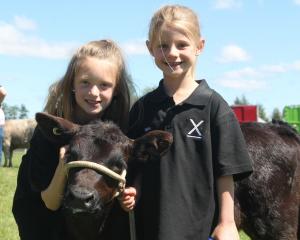
The number of inmates working on the Otago Corrections Facility’s dairy farm in South Otago has markedly reduced.
Data released to Southern Rural Life shows five prisoners worked on the farm last year, 35 fewer than in 2014.
The prison was built in 2007 on a 160ha dairy farm in Milburn owned by the Department of Corrections.
About 130ha of the property remains a dairy farm, milking about 300 cows once a day.
Tony McDonnell, who was one of the first farmers to employ Otago Corrections Facility prisoners, said he believed restrictions tightened nationally many years ago when a convicted murderer on temporary release from a North Island prison winged it to South America.

"That guy Smith changed everything."
Otago Corrections Facility prison director David Miller said Smith’s escape from prison might have been a contributing factor to the drop in numbers on the farm between 2015 to 2017.
After the escape, Corrections took immediate steps to ensure public safety, he said.
One of those steps was to provisionally suspend the temporary release of prisoners, with some specific exemptions for those taking part in release to work, supervised programmes or with exceptional circumstances, he said.
"This was a temporary measure to ensure public safety while a comprehensive review into our procedures surrounding prisoner activities outside the prison perimeter was completed."
A reason for fewer prisoners working on the prison farm now was an increase in the number of high security beds at the Otago facility.
"Having a higher proportion of high security prisoners has impacted the number of prisoners who are assessed as suitable and safe to work across all industries in the prison, including the farm."
The prison operations had also been significantly impacted by Covid-19 across the past few years.
"We have been restricted in our ability to have people in prison working on the farm during this time."

The size of the farm and the number of cows it milks had not reduced and it continued to operate with the same number of instructors.
All of the instructors had qualifications in farm management, Mr Miller said.
Mr McDonnell remembers employing dozens of prisoners through the release-to-work programme.
He first began employing prisoners within weeks of the prison opening.
At that time he owned two dairy farms in Clarendon, north of Milburn.
He said he was always looking for staff.
"We would have been lost without them."
The programme was a great way for prisoners to re-establish work habits, but back then the programme was much more relaxed.
Often he would pick up prisoners from the facility at 4.30am or a prisoner would ride a bicycle to work, he said.
"You could get them on demand."
Some of the prisoners were "really good guys" and some were not.
He remembers a prisoner got caught attempting to smuggle a memory stick containing porn into the prison, after he had been working on the farm. That prisoner never returned to work.
A Corrections spokesman said the department had a zero tolerance for contraband.
"Any prisoner found with contraband will be held to account for their actions."

The sharemilker also relied on prisoners to work on the farm until 2019.
Mr McDonnell now runs the farm but due to the remote location, he no longer employs prisoners.
"It is too hard getting them here and back."
Now he employs migrant staff.
Mr Miller said most of the prisoners had no formal qualifications and limited education or work experience before coming to prison.
"We know that helping prisoners gain education, qualification, or employment skills increases their likelihood of finding employment when they are released.
"We are committed to continuing to provide opportunities, such as the farm, as it reduces the likelihood of re-offending and contributes to keeping our communities safe."
















